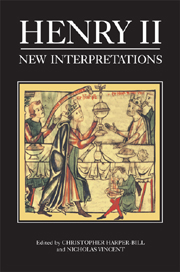Book contents
- Frontmatter
- Contents
- List of Illustrations
- Editor's Preface
- List of Abbreviations
- Introduction: Henry II and the Historians
- The Accession of Henry II
- Henry II and Louis VII
- Doing Homage to the King of France
- Henry, Duke of the Normans (1149/50–1189)
- Henry II and England's Insular Neighbours
- Henry II, the English Church and the Papacy, 1154–76
- On the Instruction of a Prince: The Upbringing of Henry, the Young King
- Henry II and the Creation of the English Common Law
- Finance and the Economy in the Reign of Henry II
- Henry II and the English Coinage
- The Court of Henry II
- Literary Culture at the Court of Henry II
- Henry II and Arthurian Legend
- Index
Literary Culture at the Court of Henry II
Published online by Cambridge University Press: 12 September 2012
- Frontmatter
- Contents
- List of Illustrations
- Editor's Preface
- List of Abbreviations
- Introduction: Henry II and the Historians
- The Accession of Henry II
- Henry II and Louis VII
- Doing Homage to the King of France
- Henry, Duke of the Normans (1149/50–1189)
- Henry II and England's Insular Neighbours
- Henry II, the English Church and the Papacy, 1154–76
- On the Instruction of a Prince: The Upbringing of Henry, the Young King
- Henry II and the Creation of the English Common Law
- Finance and the Economy in the Reign of Henry II
- Henry II and the English Coinage
- The Court of Henry II
- Literary Culture at the Court of Henry II
- Henry II and Arthurian Legend
- Index
Summary
Investing physical phenomena with meaning was second nature to a twelfth-century monastic chronicler such as William of Malmesbury. An eclipse of the sun, for example, he would embrace, in common with many of his contemporaries, as a heaven-sent pretext for establishing a causal connection between the cosmic and the mundane. Trained to recognise the ubiquity of the divine, and zealous in decoding its signs, he contrives to adorn his narrative of Henry I's departure from England in August 1133 with earth-shattering presages of the king's death in Normandy — an event that was actually to take place (after an incautious meal of lamprey at the end of a heavy day's hunting) well over two years later:
Divine providence was brought to bear in a truly remarkable way on human affairs, … and the very elements expressed their sorrow at this great man's final departure. For on that day, at the sixth hour, the sun — to quote the words of the poets — shrouded its resplendent face in hideous darkness, striking terror into men's hearts by an eclipse. On the sixth day of the week, in the early morning, there was so great an earthquake that, following a horrendous subterranean rumbling, the ground appeared to give way completely underfoot. During the eclipse, I myself saw stars around the sun, and at the time of the earthquake the wall of the house where I was sitting was lifted bodily into the air by two shocks before coming back down to earth again with a third.
- Type
- Chapter
- Information
- Henry IINew Interpretations, pp. 335 - 361Publisher: Boydell & BrewerPrint publication year: 2007

